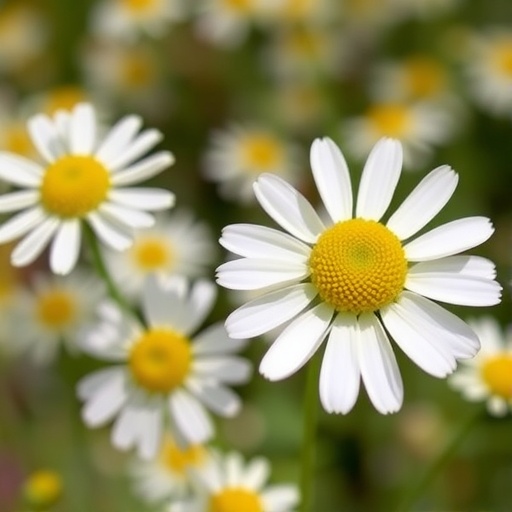In a fascinating revelation from the realm of biochemistry, researchers have turned their attention to German chamomile, scientifically known as Matricaria chamomilla. This age-old herb, heralded for its calming and anti-inflammatory properties, is also revealing a more complex role in the realm of liver function and metabolic processes. A study published in Biochemical Genetics delineates the mechanisms by which this plant can induce the expression of cytochrome P450 enzymes, driven by the modulation of the BMAL1 protein within liver nuclei.
The significance of cytochrome P450 enzymes cannot be overstated, as they are pivotal in the metabolic processing of various substances, including drugs, environmental toxins, and endogenous compounds. These enzymes operate at the forefront of hepatic metabolism, and their expression can greatly influence the efficacy and toxicity of pharmaceuticals. This makes the emerging connection between German chamomile and cytochrome P450 particularly intriguing, especially considering the widespread use of herbal supplements.
What stands out in this research is the role of BMAL1, a core protein in the circadian clock that regulates various biological rhythms. This protein’s influence on metabolic properties has been gaining traction over recent years, and now its interaction with German chamomile provides a new layer of understanding. The link between circadian rhythms and liver functions has claimed the attention of scientists as they explore the timing of metabolic activities.
In their meticulous study, Ikeda and colleagues conducted a series of experiments to probe into the effects of Matricaria chamomilla on liver cells. Their results showed a significant upregulation of cytochrome P450 enzymes in the presence of this compound, along with an increase in the expression of BMAL1. Such findings suggest that German chamomile could serve not only as a nutritional supplement but as a therapeutic agent to optimize liver function, enhancing the body’s capacity to process medications and detoxify harmful substances.
The exact pathways through which German chamomile achieves this effect are complex and multifaceted. The researchers delved into cellular signaling mechanisms to unravel how exposure to the extract translates into molecular changes. The activation of BMAL1 is particularly noteworthy, indicating that the herb might synchronize metabolic functions tied to circadian rhythms. This synchronicity can be vital considering the natural fluctuations of hormone levels and metabolic rates throughout the day.
Furthermore, the study evaluated varied doses of chamomile extract and observed consistent results across different concentrations. This suggests that the herb could play a role in personalized medicine, where specific dosages may be tailored to enhance individual detoxification capabilities and ameliorate side effects from pharmacological treatments. This could hold essential implications for patients undergoing treatments that rely on metabolic pathways heavily dependent on cytochrome P450 activity.
To put this into perspective, imagine a scenario where patients could benefit from an adjusted treatment plan in tandem with herbal supplementation that could increase their body’s ability to metabolize medications. This kind of integration between herbal medicine and modern pharmacotherapy could pave the way for more effective treatment regimes.
But the magic of German chamomile does not stop at metabolic enzyme induction. The implications of increased BMAL1 expression extend beyond mere enzyme activity; they touch on the broader interplay between lifestyle, health, and circadian biology. As lifestyle diseases continue to burgeon, understanding how such natural compounds can modulate biological rhythms holds immense potential for both preventive and therapeutic strategies.
While much is still to be explored in this field, the promise of German chamomile as a modulator of liver enzymes represents a thrilling frontier for future research. The integrative approach to studying traditional herbal medicines alongside current scientific paradigms could fuel new innovations in the healthcare landscape, blending time-honored remedies with cutting-edge science.
As the dialogues around holistic health gain momentum, studies like those conducted by Ikeda et al. remind us of the treasure trove hidden in our natural surroundings. The ethnobotanical knowledge passed down through generations now finds roots in rigorous scientific inquiry, unraveling truths that could one day redefine our approach to health and wellness.
This research brings attention not only to the biochemical aspects at play but also to the need for a greater understanding of how external factors such as diet and lifestyle influence our inner workings. The intersection of botany and biochemistry beckons a future where natural remedies may not just complement but enhance modern medicine.
Ultimately, as interest grows in herbal medicine, researchers must tread carefully to validate claims, ensuring consumer safety and therapeutic efficacy. With every study uncovering the potential of plants like German chamomile, we inch closer to a world where natural and conventional medicine coalesce, offering holistic solutions that honor the wisdom of the past while embracing the innovations of tomorrow.
In conclusion, the study of German chamomile and its effects on cytochrome P450 expression through BMAL1 paves the way for greater investigations into the potential of phytochemicals in metabolic regulation. As scientists continue to peel back the layers of these complex interactions, they illuminate pathways towards advanced therapeutic applications that could radically change our understanding of health.
Subject of Research: The impact of German Chamomile on Cytochrome P450 expression via BMAL1 protein modulation.
Article Title: German Chamomile (Matricaria chamomilla) Induces Cytochrome P450 Expression Through Increased BMAL1 Protein Expression in Liver Nuclei.
Article References: Ikeda, M., Tsurudome, Y., Enrin, M. et al. German Chamomile (Matricaria chamomilla) Induces Cytochrome P450 Expression Through Increased BMAL1 Protein Expression in Liver Nuclei. Biochem Genet (2025). https://doi.org/10.1007/s10528-025-11260-7
Image Credits: AI Generated
DOI:
Keywords: Cytochrome P450, BMAL1, German Chamomile, Metabolism, Herbal Medicine, Liver Function, Phytochemicals, Circadian Rhythms, Biochemistry.




